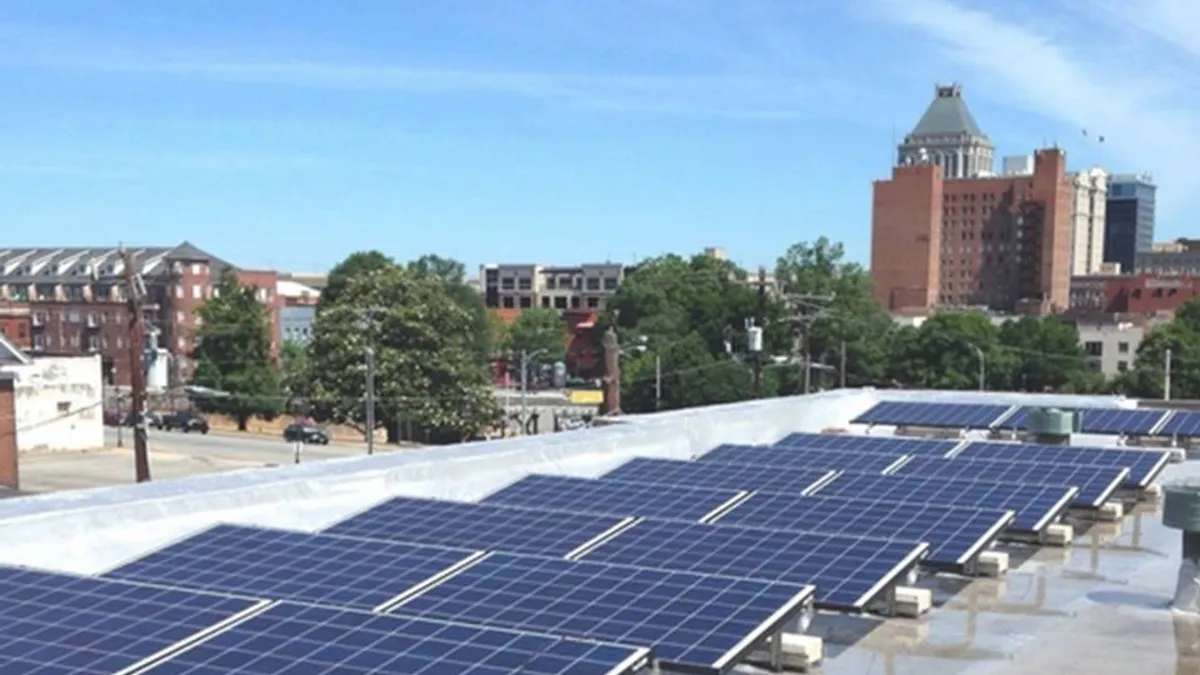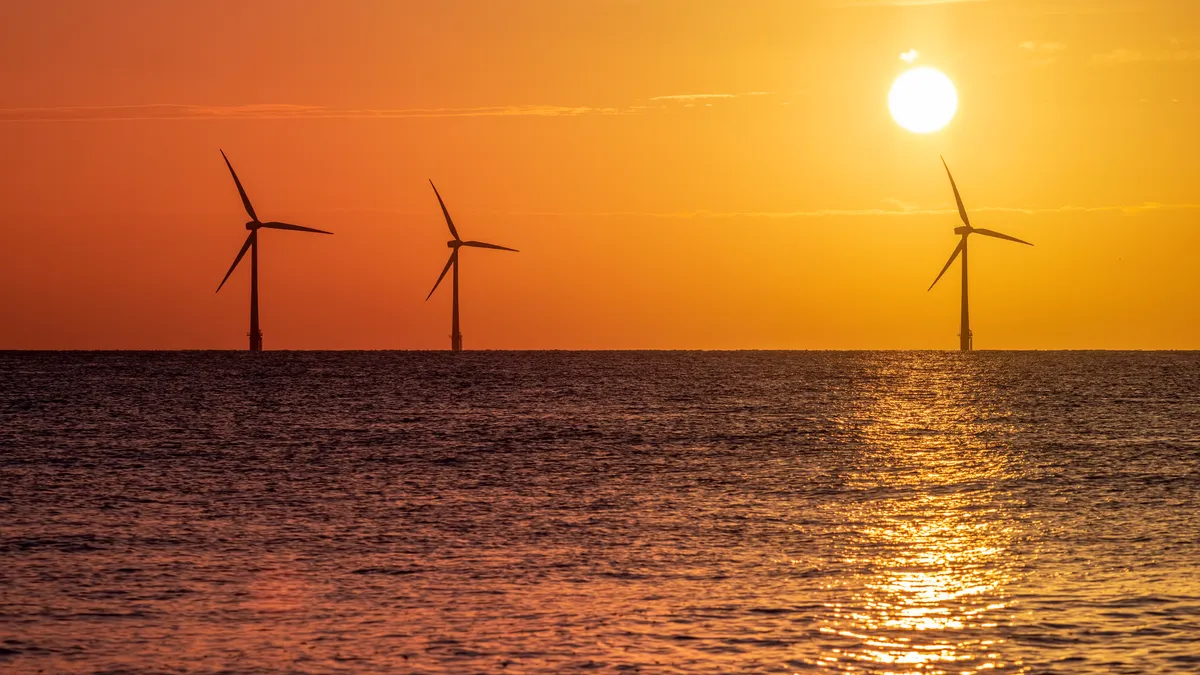An advocacy group in North Carolina is trying to advance third party-owned solar through civil disobedience.
By paying for a solar array's installation on the roof of the Faith Community Church and selling the electricity from it to the church, NC WARN, an environemental advocacy group, is testing a state law prohibiting uncertified entities from selling electricity directly to consumers, bypassing the utility.
If it can convince state regulators to expand the limits of the law, NC WARN could open the state for third party ownership (TPO) of solar, a finance plan that has spurred skyrocketing solar growth around the country but is prohibited in North Carolina.
Duke Energy, the dominant electric utility in the state and the biggest U.S. electricity provider, says NC WARN is violating the law and should be fined by the North Carolina Utilities Commission (NCUC) until it stops.
“They think the North Carolina Utilities Commission can allow third party sales in the state and they are pressing the issue,” said Duke Energy Spokesperson Randy Wheeless. “Our filing states the NCUC does not have that authority.”
“The fact that a church wants solar is quite alright with us, but NC WARN cannot sell power to a customer and not follow the rules for utilities. That is a straight fairness issue,” Wheeless added. “They say regulations are fine for Duke Energy but they don’t want to live by them.”
NC WARN argues the issue is not settled. “The Commission needs to weigh a number of factors and decide if the seller, NC WARN, is a public utility or not,” explained attorney John Runkle. “We have maintained we are not a public utility but providing a service, financing, on the Church’s side of the meter.”
The purpose of its "Solar Freedom program" test case, NC WARN’s filing adds, is to determine “whether state law prohibits third-parties, such as NC WARN, from installing solar panels and selling the power to a client, OR does only a public utility, such as Duke Energy, have the ability to do so.”
TPO financing revolutionized the solar business after 2010 and changed residential solar by bringing billions in institutional money into the sector to eliminate the high-upfront-cost adoption barrier.
In 2014, TPO-financed solar sales were 72% of the market, according to U.S. Residential Solar Financing 2015-2020 from GTM Research.
Although an increasing number of homeowners are now taking advantage of low interest rates and low installed costs to own their own solar arrays, TPO is expected to be 63% of the U.S. market this year and remain over half the market for at least the next few years.
A basic TPO plan is built around a power purchase agreement (PPA) or a lease.
With either, an installer-funder builds a solar array on a customer’s property at no cost to the property owner. The installer has both the financial benefits of ownership, like the 30% federal investment tax credit, and the responsibilities of ownership, like maintenance of the array.
In a PPA deal, that installer sells the array’s electricity to the property owner at a contracted price. At the end of the PPA contract term, the property owner can extend it or buy the array.
In a lease deal, the property owner has a lease-to-buy contract with the installer-funder. As with a car lease, the property owner makes regular payments and gets the use of the array, including its electricity, during the term as well as the option to renew or purchase when the lease expires.
Duke’s legal arguments
North Carolina law, Supreme Court precedent, and past NCUC decisions “unequivocally prohibit” the kind of TPO arrangement NC WARN has made with the Faith Community Church-Beloved Community Center group, Duke’s filing argues.
“As recently as January 27, 2015, this Commission reiterated the law in response to a specific request by the Southern Environmental Law Center,” the filing reports. It quotes the commission’s conclusion that “Chapter 62 of the North Carolina General Statutes prohibits third-party sales of electricity by nonutility solar installers to retail customers.”
Because this is established so clearly, Duke argues, NC WARN “knowingly chose to engage in its unlawful activity.”
NC WARN is acting as a “public utility,” Duke said, because it is owns and operates “equipment or facilities for producing, generating, transmitting, delivering or furnishing electricity ... for the production of light ... to or for the public for compensation.”
NC WARN’s legal arguments
“NC WARN has entered into a [PPA] with the Faith Community Church,” its filing acknowledges. The objective is to study “funding mechanisms to provide affordable solar electricity to nonprofits.”
In this “test case,” it will determine if Faith Church’s upfront costs “can be financed through the sale of electricity generated by the PV panels.”
It acknowledges that if its plan falls “within the definition of those of a public utility…[it must] comply with statutory requirements in the Public Utilities Act, and regulation by the Commission.” It believes, though, that this plan “is distinguishable from previous cases.”
It cites two commission decisions that directly address the issue, NC WARN argues. In one case, yarn company National Spinning wanted to sell excess power to an adjacent manufacturing company and asked the commission if it was legal. In a second, Progress Solar Solutions, an installer, asked the regulators for a determination of public utility status to allow it to install solar panels, lights and batteries at a public parking lot.
In the National Spinning case, the commission concluded it had been granted “considerable flexibility” by the state’s Courts to decide if an entity is attempting to sell power "to or for the public,” which require it to be a certified public utility, or whether the entity is simply generating electricity for itself, which would not.
Under that reasoning, the commission ruled that National Spinning's activity was that of a public utility, and thus not allowed under state law. But in the Progress Solar case, it used the same discretion to rule that it was not.
In the Progress Solar case, the commission followed the North Carolina Supreme Court “Simpson analysis” precedent, finding “the meaning of ‘public’ must be such as what will, in the context of the regulatory circumstances, accomplish the legislature’s purpose and comport with its public policy.”
In the current case involving the solar array on the church, NC WARN argues, it is not acting as a public utility because the electricity is not being sold “to or for the public,” but to a specific nonprofit client.
Proceeds from the sales “will go to offset much of the initial costs of the equipment and installation, funded upfront by NC WARN, and continuing maintenance of the system.” This is more like a loan, it adds. And since Duke Energy has no similar local programs, “there is no competition.”
Current state law, through North Carolina’s Renewable Energy and Energy Efficiency Portfolio Standard (REPS), encourages renewables, NC WARN's filing concludes.
“To the extent NC WARN is able to raise funds from its members, the Solar Freedom program is an investment in renewable energy, and should be encouraged.”
On this point, the Iowa Supreme Court’s decision to override state regulators and permit TPO, although a matter of Iowa law, “is worth reviewing,” NC WARN explains. “The Iowa court determined that it was contrary to public policy that ‘providing financing for solar activities should draw an entity into the fly trap of public regulation.’”
Duke’s rebuttals
Duke uses the same Simpson analysis on which the National Spinning and Progress Solar cases were decided to argue for rejection of NC WARN’s analysis. In each case, it argues, the Court held the commission was right in exercising its regulatory authority, but it had no legal authority to change the basic intent of the law preventing third party ownership.
Though NC WARN asserts “that selling electricity to this separate class of customers under its scheme should not be considered for or to the public,” the Duke filing argues, “the Supreme Court in Simpson rejected such an argument.”
Both the state Supreme Court and the NCUC have concluded that it is the General Assembly’s policy intent that “the public is better served by a regulated monopoly than by competing suppliers of the service."
Regardless of what it determined about upholding policymakers’ intent to support renewables, the Iowa Supreme Court decision “is irrelevant,” Duke adds, “because it is based upon Iowa law and precedent, which is contrary to North Carolina law and precedent.”
Finally, Duke argues, the state Supreme Court upheld the commission’s authority “to regulate an entity that has unlawfully acted as a public utility without a certificate of public convenience and necessity.”
It should, therefore, “issue a cease and desist order to NC WARN to prevent it from acting as a public utility and require it to refund the Greensboro customer for its unlawful gain from the sales of electricity.”
Duke also asks the commission to consider punitive action. It has, Duke asserts, the statutory authority to fine NC WARN up to $1,000 for each day it has violated the prohibition against acting as a public utility and “should likewise sanction NC WARN.”
That would amount to an over $120,000 fine so far for the small advocacy group.
“In the past the NCUC has penalized those operating in non-compliance and we think there should be a penalty here but we will leave up to the commission to decide,” Wheeless said. “We do think the law is very clear on our side and others agree.”
Outside arguments
In what is often an indication of how commissioners will decide a case, arguments from the NCUC staff strongly support Duke’s position.
“The Commission does not have express legal authority to allow third-party sales of Commission regulated electric utility services,” the staff asserts. In the absence of legislation making TPO legal, the Commission is “without authority” to allow NC WARN to provide such services.
The Commission should therefore “order NC WARN to immediately cease and desist” and should “encourage NC WARN to honor its commitments to the church” by donating the solar system to it.
The Energy Freedom Coalition of America (EFCA), which “seeks to promote public awareness of the benefits of solar and alternative energy through public advocacy,” filed in support of NC WARN. EFCA represents solar companies, including installers offering leases, PPAs, and loans for solar.
EFCA supports NC WARN’s effort to get clarification from the Commission on TPO for solar because, the filing explains, “the current regulatory uncertainty surrounding this issue in North Carolina functions as a barrier to entry for its member companies who offer solar leases and solar PPAs in other jurisdictions.”
H.B. 245, Act 236, and the “what ifs?"
If Republican state Representative John Szoka's Energy Freedom Act (H.B. 245) permitting TPO for North Carolina had been enacted, instead of stalling in committee during the state’s just-concluded legislative session, this dispute would not have been necessary. As the NCUC staff filing noted, H.B. 245 would have authorized the NC WARN-church arrangement.
Though the installation of the church's panels came "suspiciously close" to when it became clear the NC WARN-supported bill would be stopped, Wheeless said, “I will let them say if there was any connection.”
The timing was based largely on the installer's schedule and city inspections, responded NC WARN's Runkle. "It definitely was on a separate track from any legislation."
“The Energy Freedom Act, was widely supported by many in the General Assembly and Representative Szoka said at a recent conference he thought the bill could have passed on a straight-up vote,” said NC WARN Sr. Energy Analyst Nancy LaPlaca. “House Majority Leader Mike Hager, a former Duke employee, was said to be actively working against the bill.”
Duke acknowledged not supporting the Szoka bill. It called during the legislative session for a joint stakeholder process like the one that produced South Carolina's South Carolina’s landmark Act 236. Written by a South Carolina General Assembly-created coalition of environmentalists, solar advocates, utilities and electric cooperatives, Act 236 established a package of solar laws.
It establishes the legality of TPO solar, requires regulators to approve a Value of Solar (VOS) methodology, requires the state's IOUs to commit to more renewables, including distributed generation, expands restrictions on whatever net metering-type rate structure emerges from the VOS proceeding, and requires regulators to create a rate structure that supports DER growth.
Duke wants similarly comprehensive reforms for North Carolina solar. “What we did in South Carolina worked out well. There was give and take. Not everybody was 100% happy but at the end of the day we had a framework for how we would do things going forward. And there was not a big fight,” Wheeless said.
The North Carolina Sustainable Energy Association joined NC WARN in rejecting that Duke proposal. “To try to replicate what they did in South Carolina would be to discredit North Carolina’s progress and ignore what is now possible," NCSEA Communications Director Allison Eckley told Utility Dive earlier this year.
Duke continues to push for a North Carolina summit on solar and a comprehensive solution.
“Taken as a single issue, Duke Energy is against third party sales but in South Carolina and Georgia it was approved as a part of the give and take. As part of a comprehensive solution, it is worth discussing for North Carolina,” Wheeless said.
“A ‘comprehensive solution’ appears to be more delays, and allows Duke Energy to manipulate the outcome,” LaPlaca said. “Ratepayers deserve and want to have the basic right to choose where they purchase electricity and to use the financing system that allowed over 70% of the rooftop solar systems in the U.S. last year to be installed.”
That decision now falls to North Carolina’s regulators.





















